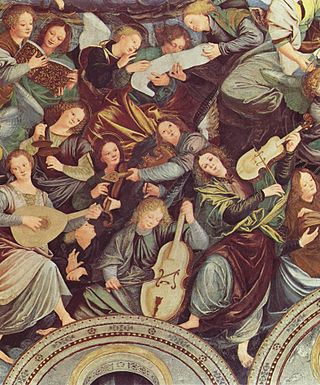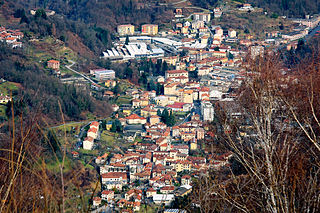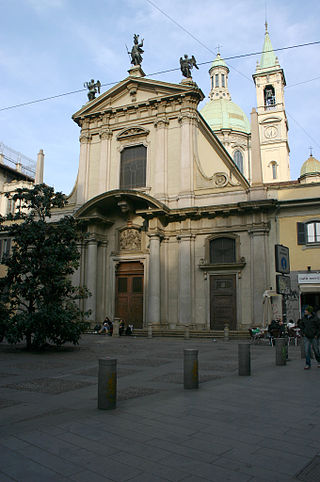
Giulio Cesare Luini (Varallo Sesia, 1512- After 1565) was an Italian painter. Giulio was a colleague of Gaudenzio Ferrari in the decoration of the Sacro Monte di Varallo. [1]

Giulio Cesare Luini (Varallo Sesia, 1512- After 1565) was an Italian painter. Giulio was a colleague of Gaudenzio Ferrari in the decoration of the Sacro Monte di Varallo. [1]

Gaudenzio Ferrari was an Italian painter and sculptor of the Renaissance.
Varallo Sesia, pronunciation (Vhuh-rahl-loh) commonly known as Varallo, is a comune and town in the province of Vercelli in the Piedmont region of Italy. It is situated in Valsesia, at 450 metres (1,480 ft) above sea level and some 66 kilometres (41 mi) north-northeast of Vercelli and 55 kilometres (34 mi) northwest of Novara.

The Sacri Montiof Piedmont and Lombardy are a series of nine calvaries or groups of chapels and other architectural features created in northern Italy during the late sixteenth century and the seventeenth century. They are dedicated to various aspects of the Christian faith and are considered of great beauty by virtue of the skill with which they have been integrated into the surrounding natural landscape of hills, forests and lakes. They also house important artistic materials in the form of wall paintings and statuary. In 2003, they were named as a World Heritage Site.

Valduggia is a comune (municipality) in the Province of Vercelli in the Italian region Piedmont, located about 90 kilometres (56 mi) northeast of Turin and about 45 kilometres (28 mi) north of Vercelli.

Pier Francesco Mazzucchelli was an Italian painter and draughtsman who was active in Milan. He is mainly known for his altarpieces, but his outstanding achievements are large decorative frescoes for the Sacro Monte di Varese and the Sacro Monte di Varallo.

Antonio d'Enrico, called Tanzio da Varallo, or simply il Tanzio was an Italian painter of the late-Mannerist or early Baroque period.

The Museo Civico d'Arte Antica is an art museum located in the Palazzo Madama in Turin, Italy. It has a renowned collection of paintings from the medieval, Renaissance and Baroque periods. It reopened in 2006 after several years of restorations.

The Sacred Mountain of Varallo is a Sacro Monte overlooking the town of Varallo Sesia in the province of Vercelli, Piedmont, northern Italy. It is the oldest Sacro Monte, founded in 1491 by Franciscan friar Bernardino Caimi. It is built on a natural terrace on the rocky slopes of Monte Tre Croci, on the left bank of the Sesia river where it leaves Val Mastallone. It is 600 m above sea level, 150 m above the historic centre of Varallo.

Sant'Angelo is a church in Milan, Lombardy, northern Italy, belonging to the Franciscan Order.

Santa Maria dei Miracoli presso San Celso is a church and a sanctuary in Milan, Lombardy, northern Italy.

Giovan Battista della Cerva was an Italian painter.

San Giorgio al Palazzo is a baroque-style, Roman Catholic church in central Milan, region of Lombardy, Italy.

Benedetto Innocenzo Alfieri was an Italian architect, a representative of the late-Baroque or Rococo style.

Michele Cusa was an Italian painter.

Pietro Maggi was an Italian painter of the late-Baroque period.

The Church of Our Lady of the Graces is a Gothic-style, Roman Catholic church in Varallo Sesia, province of Vercelli, region of Piedmont, Italy. The church was built, together with the adjacent Franciscan convent, by padre Bernardo Caimi between 1486 and 1493. At this time, the construction of the Sacro Monte was also beginning. In December 1931, Pope Pius XI gave the church the title of Minor Basilica.

San Lorenzo is a Gothic architecture, Roman Catholic Basilica church in Mortara, Province of Pavia, region of Lombardy, Italy.

Fermo Stella was an Italian painter of Lombardy and Piedmont, mostly in rural churches and sanctuaries. Art historians from the 19th century cite erroneously Fermo as active at dates that range from the 15th century to 1577.

Francesco Fasola was an Italian member of the Congregatio Oblatorum Sanctorum Gaudentii et Caroli Novariae who served as the Archbishop of Messina from 1963 until his retirement in 1977. He served as a rector and parish priest after his ordination in Galliante before he was made a bishop in 1954 for the Agrigento diocese where he served as the coadjutor; he later was moved south to Caltagirone and then was made an archbishop. Fasola placed a particular emphasis during his episcopate on the renovation of ecclesial buildings and the ordination of new priests which was a sacrament he liked to bestow upon seminarians.